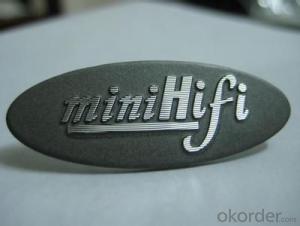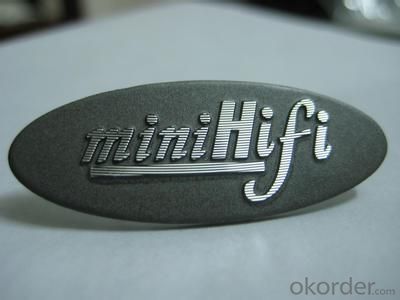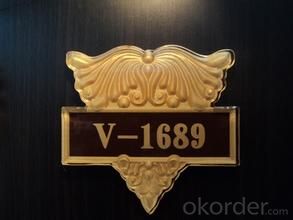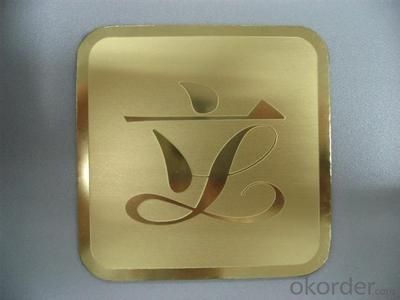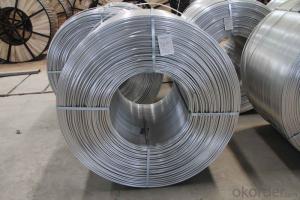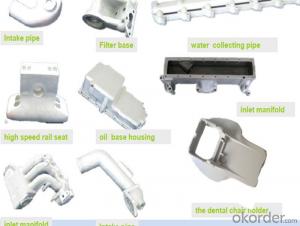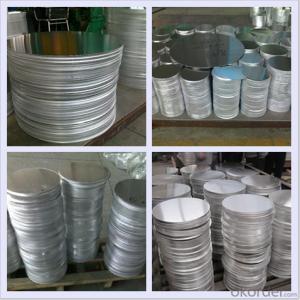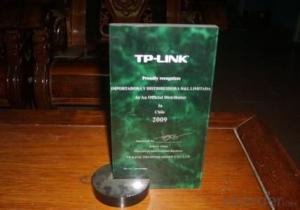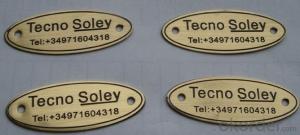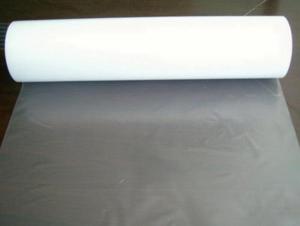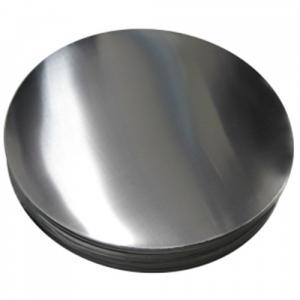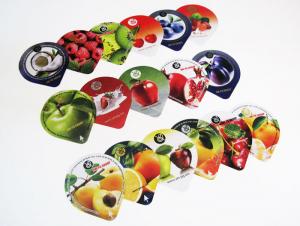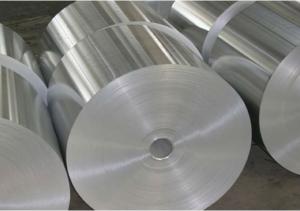Aluminum Metal Auto Emblem Scutcheon, 3D Bottle Label
- Loading Port:
- Shanghai
- Payment Terms:
- TT or LC
- Min Order Qty:
- 1000 pc
- Supply Capability:
- 1000000 pc/month
OKorder Service Pledge
OKorder Financial Service
You Might Also Like
Specifications
1.Material:Aluminum, copper, stainless steel, metal materials
2.Process:Metal printing machine .
3.Back:Adhesive backed and/or with mounting holes.
4.Features:The perfect product delicate, durable anti-corrosion, wear-resisting, will never fade.
5.Size :Can be any size, shape.
6.Color:According to customer's request(CMYK or pantone color).
7.Packing:Every plastic bag packaging, OPP packaging, standard export carton packaging.
8.Other:OEM or ODM will be welcomed, Small MOQ depending on customer’s request, can be negotiated.
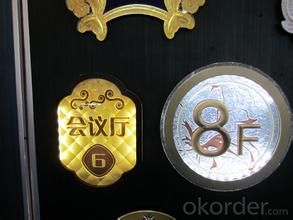
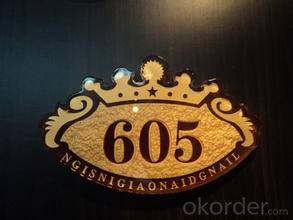
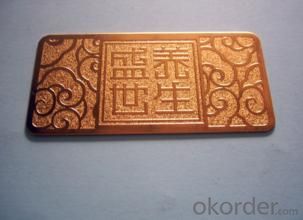
Our advantages:
1.many years of production experience;
2.free design service(professional designers);
3.good quality and competitive price;
4.small MOQ ;
5.mould charge is refundable when the quantity of badge is over 10000 pcs;
6.free design artwork of your nameplate;
Huanyang Scutcheon has been manufacturing quality nameplates and labels with exceptional value for more than 15 years.
7. Metal scutcheon kind: copper, aluminum, iron, stainless steel, metal stamping, corrosion marking nameplate, hollow, polishing, glossy, brushing, sandblasting, oxidation, plating chromatically, and metal surface printing, offset printing, etc.
8. Metal die-casting scutcheon categories: zinc alloy, tin antimony alloy product, via die-casting, polishing, electroplating, coloring, etc.
9. Plastic scutcheon categories: all kinds of plastic tag, signage, pendant products, PP, PC, PET, PVC plastic nameplates, adapt to electrical, electronics and instrument products.
10.Other: Badge, Medal,metal tag etc.
- Q: What characteristics distinguish pure aluminum from its alloyed forms?
- <p>Pure aluminum is a soft, lightweight, and highly malleable metal with good electrical and thermal conductivity. It is often used for its corrosion resistance and is relatively inexpensive. Aluminum alloys, on the other hand, are made by combining aluminum with other elements like copper, magnesium, silicon, or zinc to enhance its properties. These alloys are stronger, more durable, and can be tailored for specific applications, such as in aerospace, automotive, or construction. They offer improved strength-to-weight ratios, better resistance to heat and wear, and can be anodized for enhanced surface properties. While pure aluminum is more ductile and easier to weld, aluminum alloys provide greater versatility in terms of mechanical properties and performance.</p>
- Q: Can reusing old aluminum foil be utilized for cleaning tasks in kitchen or bathroom areas?
- <p>Yes, old aluminum foil can be used for cleaning purposes in a kitchen or bathroom. It's particularly effective for scrubbing pots and pans, removing burnt-on food, and cleaning glass and tiles. The shiny side of the foil can be used to remove scuff marks from floors and the dull side can be used to scrub away stubborn stains. However, it's important to avoid using foil that has been in contact with acidic or corrosive substances, as it may have become damaged or weakened, and could potentially scratch surfaces. Always test on a small, inconspicuous area first to ensure it doesn't damage the surface you're cleaning.</p>
- Q: This question asks for various methods that can be used to recycle aluminum.
- <p>Recycling aluminum can be done through several methods, including mechanical recycling, which involves melting and reprocessing aluminum without altering its chemical properties. This is the most common method due to its efficiency and cost-effectiveness. Another method is chemical recycling, where aluminum is treated with chemicals to break it down into its constituent elements, which can then be repurposed. Additionally, aluminum can be recycled through a process called hydrometallurgical recycling, which uses aqueous solutions to extract aluminum from waste. Finally, sorting and collection play a crucial role in ensuring that aluminum waste is directed to appropriate recycling facilities where these methods can be applied.</p>
- Q: This question asks about the methods used to determine the purity level of aluminum.
- <p>The purity of aluminum is typically measured using various analytical techniques. One common method is spectroscopy, which can identify and quantify the elements present in a sample. Techniques such as X-ray fluorescence (XRF) and Inductively Coupled Plasma Mass Spectrometry (ICP-MS) are used to analyze the composition of aluminum alloys and determine the concentration of impurities. Additionally, metallographic examination can reveal the presence of inclusions or other impurities that affect purity. The American Society for Testing and Materials (ASTM) and other standards organizations provide specific guidelines and methods for testing aluminum purity.</p>
- Q: Can recycled aluminum be utilized in the production of solar panels and other renewable energy technologies?
- <p>Yes, recycled aluminum can be used to make solar panels and other renewable energy sources. Aluminum is a key component in solar panel frames and mounting structures due to its lightweight, high strength, and corrosion resistance. Recycling aluminum saves energy and resources compared to mining and refining new aluminum. Additionally, recycled aluminum can be used in wind turbines, hydroelectric generators, and other renewable energy technologies where its properties are beneficial. The use of recycled materials in renewable energy production contributes to a more sustainable and circular economy.</p>
- Q: This question asks for various applications or purposes that can be served by using aluminum scrap material.
- <p>Aluminum scrap can be repurposed in numerous ways due to its recyclability and durability. Some alternative uses include manufacturing new aluminum products, such as cans, foil, and automotive parts. It can also be used in construction for materials like window frames and roofing. Additionally, aluminum scrap is utilized in the production of everyday items like bicycles, furniture, and even in some types of cookware. Furthermore, it can be employed in the aerospace industry for aircraft parts and in the electronics industry for components. Recycling aluminum scrap not only conserves resources but also reduces energy consumption and environmental impact.</p>
- Q: This question asks for examples of how recycled aluminum can be utilized.
- <p>Recycled aluminum has numerous applications, including the manufacturing of beverage cans, automotive parts, construction materials, and electronic components. It is also used in the production of aluminum foil, packaging materials, and various household items. Recycled aluminum is valued for its durability, lightweight properties, and energy efficiency in production, making it an environmentally friendly choice for many industries.</p>
- Q: What measures should be taken to ensure safety while working with aluminum?
- <p>When working with aluminum, it's important to follow safety precautions. Always wear appropriate personal protective equipment (PPE) such as gloves, safety glasses, and a dust mask to prevent inhalation of aluminum dust. Ensure good ventilation to avoid the buildup of fumes. Use proper tools and equipment to handle aluminum, as it can become sharp and cause cuts. Be cautious of the heat generated during cutting or welding, as aluminum conducts heat quickly and can cause burns. Store aluminum in a dry place to prevent it from reacting with moisture, which can cause it to corrode. Lastly, be aware of the fire hazard associated with aluminum dust and take necessary fire prevention measures.</p>
- Q: This question asks for examples of alloys that include aluminum as a primary component.
- <p>Aluminum is a versatile metal that forms several common alloys used in various industries. Some of the most common aluminum alloys include: 1. 1000 series, which is pure aluminum with a high percentage of aluminum content. 2. 2000 series, known for their strength due to copper content. 3. 3000 series, which are non-heat-treatable alloys with good formability and are rich in manganese. 4. 5000 series, characterized by their magnesium content, making them strong and resistant to corrosion. 5. 6000 series, which are heat-treatable and contain silicon and magnesium, offering good mechanical properties. 6. 7000 series, the strongest aluminum alloys, containing zinc as the primary alloying element. These alloys are widely used in aerospace, automotive, construction, and other industries due to their lightweight and strength.</p>
- Q: This question asks for a comparison of the benefits and drawbacks of using aluminum as a material in construction projects.
- <p>Aluminum in construction offers several advantages, including its lightweight nature, which reduces structural load and facilitates easier transportation and installation. It is also highly resistant to corrosion, making it ideal for outdoor applications and in areas with harsh weather conditions. Aluminum's recyclability contributes to sustainability, and it has a high strength-to-weight ratio, enhancing structural integrity. However, it has some disadvantages, such as being a poor conductor of heat, which may require additional insulation. It can also be more expensive than traditional materials like steel or concrete, and it dents easily, necessitating careful handling and maintenance.</p>
Send your message to us
Aluminum Metal Auto Emblem Scutcheon, 3D Bottle Label
- Loading Port:
- Shanghai
- Payment Terms:
- TT or LC
- Min Order Qty:
- 1000 pc
- Supply Capability:
- 1000000 pc/month
OKorder Service Pledge
OKorder Financial Service
Similar products
Hot products
Hot Searches
